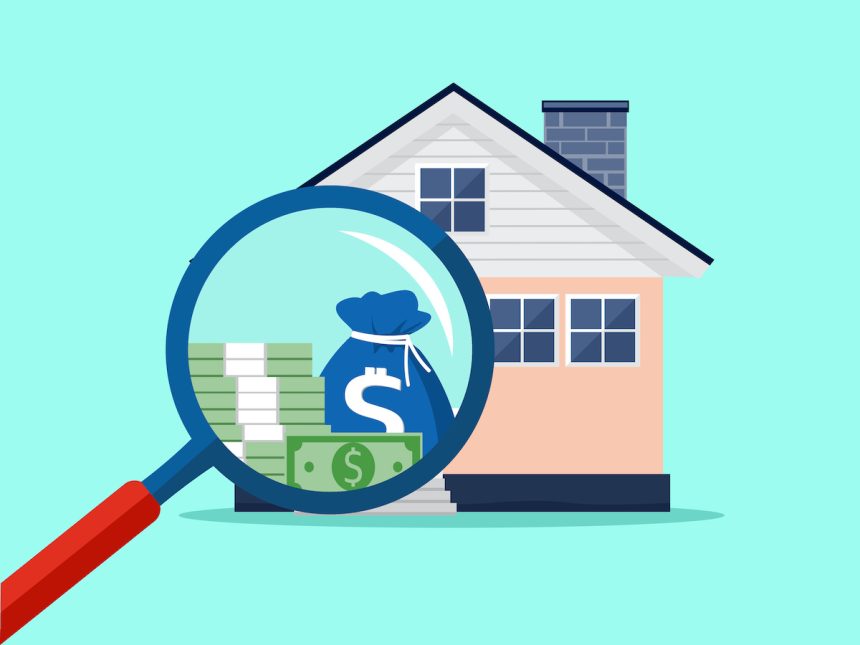When you put your signature on the dotted line, your home transforms into one of your most significant investments. As you invest time and money in renovating and maintaining your property, its value should appreciate over time. Recognizing the value of your home can play a vital role when you come to make crucial decisions about your primary investment, whether it involves selling your property, refinancing your mortgage, or seeking funds for home renovations.
How Much Is My House Worth?
Determining the right price for your home if you decide to list it for sale can be a complex task involving various factors that can either increase or decrease its value. To arrive at an accurate valuation, you may seek the expertise of trained professionals or explore different methods commonly used in the real estate industry:
- Appraised Value: Licensed appraisers play a crucial role in determining the worth of your property. They consider multiple variables such as the size of your home and any upgrades you’ve made, ultimately arriving at a fair price. This type of valuation is often sought when individuals are looking to obtain or refinance a mortgage.
- Assessed Value: The local county tax assessor typically conducts property assessments. The assessed value of your home is used to calculate the amount of local, county, and state taxes you will be required to pay. This method involves comparing your home to other nearby properties and their respective valuations, as well as considering its overall location within the community, size, upgrades, and other relevant aspects.
- Fair Market Value: This valuation approach involves comparing your home to similar properties in the vicinity. Factors such as square footage, the number of bedrooms, and the general location are taken into account to determine the fair market value. This method is commonly used to gauge a property’s worth based on its comparability to others in the current real estate market.
Factors That Determine a Home’s Value
Your home’s market value is influenced by a variety of factors, and several of them are beyond your control. Elements such as neighborhood safety, the quality of schools, the condition of surrounding properties, and other environmental factors play a significant role in determining the value of your home. As you may have observed during your own home-shopping experience, these aspects hold great importance for potential buyers.
Location, school system, convenience
The age-old adage holds undeniable truth—it’s all about location, location, location. The geographical placement of your home can exert the most significant influence on its value. Properties situated in noisy, neglected neighborhoods tend to sell for less than those found in tranquil, well-maintained areas of the town. Prospective homeowners prioritize essential factors such as reputable school districts, easy access to public transit, proximity to shopping and entertainment facilities, and the availability of job opportunities, especially if they are not relocating for work purposes.
Past home sales in the surrounding area
Another crucial factor in determining your home’s value is the recent selling prices of neighboring properties. When assessing comparable homes, you would generally focus on those that closely resemble your own in terms of defining features, such as the number of bedrooms and bathrooms. By using these specific criteria, you can narrow down the pool of potential matches, providing you with a more accurate and insightful understanding of how similar houses have performed in the market.
Upgrades you’ve made to your home
Your home’s value can significantly increase if you’ve made certain valuable additions and upgrades. For instance, the installation of solar panels, on-site electric car plug-ins, and fully automated lawn sprinkler systems can enhance its appeal and functionality. Additionally, investments in efficient heating and air conditioning systems, the latest home security technology, and energy-saving windows can contribute to making your home stand out when compared to other properties listed for sale. These features not only add value but also make your home more attractive to potential buyers looking for modern and eco-friendly amenities.
The current market
The price of your home is influenced by various factors, and the housing market plays a vital role in establishing its value. Elements such as labor conditions and interest rates can impact the overall dynamics of the market. When the number of homes available exceeds the number of buyers, a “buyer’s market” prevails, leading to lower prices. Conversely, when there are more buyers than available homes, a “seller’s market” emerges, favoring homeowners and potentially driving prices higher.
By keeping a close eye on the market trends, you can gauge the optimal time to sell your home. Understanding whether it’s a buyer’s or seller’s market allows you to make informed decisions about listing your property, ensuring that you maximize its potential value based on the prevailing market conditions.
How Long Should You Live in a House Before Selling?
Homeownership has always been regarded as a significant investment, especially for young couples and families embarking on their journey. Owning a home not only positively impacts your overall health and well-being but also begins to build equity over time. As reported by Habitat for Humanity, “The Health Benefits of Home Ownership” are substantial.
While every investment carries inherent risks, homes typically appreciate in value as the years pass. The housing market and real estate prices may experience cycles of booms and busts, but the general belief is that the longer you reside in a home, the greater potential profit you can derive from it when you eventually decide to sell.
There isn’t a rigid rule on the ideal duration to live in a home before selling, but several factors come into play. Consider how much you initially paid for the house and any additional costs, such as closing fees, real estate agent fees, and mortgage interest. Based on these expenses, it may be advisable to hold onto the property for at least five years before re-entering the housing market for a sale. This period allows you to recoup initial expenses and potentially benefit from an increase in property value over time.
Can You Personally Check Your Home’s Value Online?
There are several online tools available that can provide you with a rough estimate of your home’s worth. These tools utilize public data to calculate an approximate value for your property. It’s important to note that different websites may offer varying estimates, so the values should be treated as rough guidelines rather than precise figures. Some of the most popular online options for home valuation include Zillow, Realtor.com, Trulia, and Redfin. These platforms can give you an initial idea of your home’s value, but for a more accurate assessment, it is recommended to consult with a licensed appraiser or real estate professional.
Can Mortgage Interest Rates Impact a Home’s Value?
Mortgage interest rates can significantly impact a home’s sale value. When interest rates are lower, homebuyers have more money available to spend on the actual home purchase, which can lead to overall better prices for homes. In contrast, in a high-interest rate environment, homebuyers may have to allocate more of their budget to mortgage payments, leaving less to spend on the home’s purchase price.
For sellers, this means that they may need to adjust their price expectations accordingly. In a high-rate environment, buyers may be more constrained in their budget, and sellers should be prepared for the possibility of receiving lower offers for their homes. On the other hand, in a low-rate environment, sellers may have more leverage as buyers have more purchasing power.
Ultimately, understanding the current mortgage interest rate climate and its potential impact on homebuyers’ budgets can help sellers set realistic pricing strategies and make informed decisions during the home selling process.
The Bottom Line
Owning a home is a significant investment, and unlike many other assets, housing tends to appreciate over time. However, the value of your home can be influenced by external factors. As with any investment, it is crucial to stay informed about your home’s market value, particularly if you are considering selling it in the future. Keeping track of your property’s worth will help you make informed decisions and maximize your potential return on investment when the time comes to sell.












